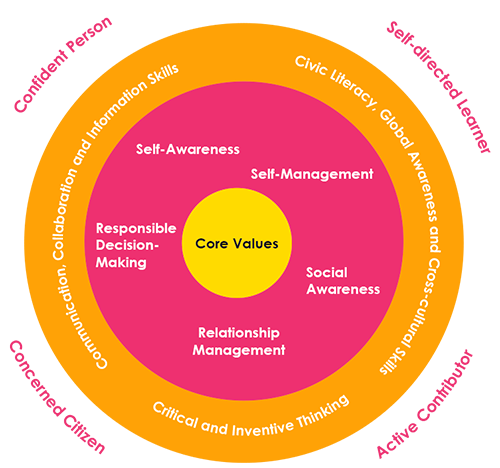Social Emotional Learning
.jpg)
Social-Emotional Development
SOCIAL AND EMOTIONAL LEARNING
(MINISTRY OF EDUCATION, SINGAPORE)
Social and Emotional Learning (SEL) is an umbrella term that refers to students’ “acquisition of skills to recognise and manage emotions, develop care and concern for others, make responsible decisions, establish positive relationships, and handle challenging situations effectively” Briefly, it refers to skills to manage self, relate to others positively and make responsible decisions.
Key Domains of Social and Emotional Skills
There are five interrelated sets of cognitive, affective and behavioural competencies in SEL and they are clustered as five key domains of social and emotional skills.
Guiding Principles of SEL
The teaching and facilitation of SEL in Singapore schools is guided by four principles.
- Principle 1:
Values are at the core as they guide and provide the purpose for one’s behaviours. Values refer to the core values that are being explicitly taught in the curriculum. Enactment of actions without grounding in values would lead to inconsistency in purpose and actions.
- Principle 2:
Social and emotional competencies should be taught to students to ensure that they acquire the skills, knowledge and dispositions that will help them face future challenges. The five key domains of skills are Self Awareness, Social Awareness, Self-Management, Relationship Management, and Responsible Decision Making. Teaching of social and emotional skills to students can be explicit, through infusion or through teachable moments.
- Principle 3:
Schools play an important role in the teaching of social and emotional skills because school leaders and teachers are important role models of these skills. Furthermore, the school environment is an important enabler of student learning that supports the teaching and learning of social and emotional skills.
- Principle 4:
Children equipped with social and emotional skills, anchored on sound values, will be able to demonstrate good character and citizenship.
Outcomes of SEL
Through SEL, our students acquire skills, knowledge and dispositions to manage self and relationships effectively and make responsible decisions essential for personal and social well-being. Research shows a strong link between SEL and student outcomes in the areas of mental well-being, character development, school success, career success and responsible citizenship.
SEL is a critical part of our students’ learning to prepare them to live and work as adults in the 21st Century. SEL is taught within the Character and Citizenship Education (CCE) curriculum in school.

SEL and the School Culture of Care
“There are no bad children, only bad circumstances.”
SEL is taught and facilitated in the context of a safe and caring school environment. A key factor of a caring and supportive school environment is positive teacher-student relationship and a holistic support system that promotes student’s social and emotional well-being.
Counselling services are offered in school for students who need additional help in the area of social and emotional development, as evidenced by social, emotional and behavioural concerns presented by these students. Teachers and parents and may refer at-risk students to the School Counsellor. Students may also refer themselves or their friends to the School Counsellor should they require additional mental health/ social-emotional support.
The School Counsellor is a certified professional who : 1) works closely with the school management in planning and implementing a school-wide counselling system, 2) provides direct counselling intervention to at-risk students and case consultations to school personnel and parents, 3) devises and delivers specialized group guidance programmes for at-risk students 4) trains teachers and parents on counselling-related issues.

